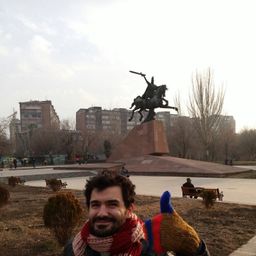
Sessions in which Mesut Dinler participates
Sunday 5 June, 2016
Sessions in which Mesut Dinler attends
Friday 3 June, 2016
Saturday 4 June, 2016
What if we changed our views on heritage? And if heritage has already changed? While, on the global scene, states maintain their leading role in the mobilization of social and territorial histories, on the local scale, regions, neighbourhoods and parishes have changed. Citizens and communities too: they latch on to heritage to express an unprecedented range of belongings that no law seems to be able to take measures to contain, often to the discontent of...
Many people are actively using working class heritage as a resource to reflect on the past and the present, and there is a growing tendency for the heritage of working class people to be interpreted and presented to the public in museums and heritage sites—see for example the Worklab network of museums. Working class communities and organizations also play active roles in creating a memory of their own past, and mobilizing this to sustain political action in the present. Drawing on scho...
The contemporary movement of heritagization, characterized by a multiple expansion (typological, chronological, spatial) of heritage and of heritage producers (local actors, inhabitants, social groups, national states, international players), nourishes also the production of alternative heritage. By this expression, we wish to focus on non-institutional, dissonant, under-recognized heritage, located on the “pioneer front” of contemporary heritage production. Alter-heritage represents, therefo...
Most of what we experience as heritage emerges into conscious recognition through a complex mixture of political and ideological filters, including nationalism. In these processes, through a variety of devices (museums, scholarly research, consumer reproduction, etc.), dualistic classifications articulate a powerful hierarchy of value and significance. In particular, the tangible-intangible pair, given legitimacy by such international bodies as UNESCO, reproduces a selective ordering of cul...
Sunday 5 June, 2016
Canal: Walking the Post-Industrial Lachine Canal (COHDS, 2013 - bilingual) is an audio-walk and booklet that takes listeners from the Atwater Market to the Saint Gabriel Lock, exploring the post-industrial transformation of a once heavily industrialized area. The Lachine Canal area has undergone dramatic changes, as mills and factories were closed and then demolished or converted into high-end condominiums. The adjoining working-class neighbourhoods ...
"What does heritage change?" is a multifaceted question to which the answer(s) are in primary respects related to real-life negotiations among different groups of citizens, cultures, races, ethnic groups, sexual identities, and social classes about received, official and/or widely accepted or accomodated intangible attributes, cultural traditions, historic monuments, buildings, and other transmitted or revived historical legacies. Heritage designated by and for whom, for what motivations, an...
Directed by Tom Fassaert and presented by Marc Jacobs. ___ Doel, a Belgian village near the Dutch border, is disappearing quickly and deliberately. Not because of the four old nuclear reactors on its territory, but because the Flemish government decided that the village might block projects for new docks for the Antwerp harbour, plans developed since the 1960s. In the 21st century this process of officially encouraged depopulation is coming to an end: 2500 inhabitants i...
Monday 6 June, 2016
La Pointe: L’autre bord de la track / The Other Side of the Tracks (COHDS /Public History Students, 2015 - bilingual) takes walkers into a working-class neighbourhood that has undergone massive deindustrialization and is now gentrifying. Pointe-Saint-Charles is also known for its place-based activism and strong neighbourhood identity. Produced by the oral history students in Steven High’s Working Class Public History course, working closely with two other cl...
This session seeks to explore the role of urban heritage in mediating and contesting political conflict in the context of divided cities. We take urban heritage in a broad sense to include places left, scarred or transformed by geo-political dispute, national and ethnic division, violence and war. The case studies can include tangible spaces such as elements of border architecture, historic sites, ruins and urban traces of the conflict, and memorials; as well as intangible elements of city, i...








